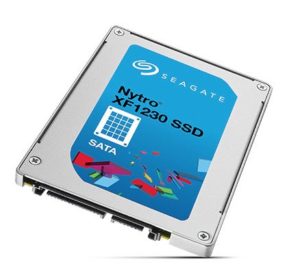 Today Seagate announced the Nytro XF1230 SATA SSD, an energy-efficient drive specifically designed to meet the performance and reliability requirements of today’s cloud data centers.
Today Seagate announced the Nytro XF1230 SATA SSD, an energy-efficient drive specifically designed to meet the performance and reliability requirements of today’s cloud data centers.
SSDs in enterprise data centers provide extremely fast data access in a small footprint, while consuming very little energy. No SSD in its class does this better than Seagate’s latest addition to the Nytro product line,” said Brett Pemble, Seagate’s general manager and vice president of SSD products. “This is a critical addition to our growing SSD portfolio and an answer to what our enterprise customers have been asking for: a highly reliable, very low-latency SATA SSD that’s also energy efficient. It also means more people get more value from more data for lower cost.”
The Nytro XF1230 SATA SSD features a 6 gigabit-per-second interface, making it easy to deploy in existing storage infrastructures. Optimized for read-centric databases and workloads, it provides random access performance as high as 98,000 input/output operations per second (IOPS), equivalent to the performance of 200 hard disk drives, but for a fraction of the power and cost. Additionally, the drive offers enterprise-class reliability, with the level of protection needed in today’s cloud environments, including a power loss data protection circuit to prevent data loss in the event of a power disruption.
The Nytro XF1230 SATA SSD is energy efficient, with a power demand that tops out at 4.8 watts at maximum supported capacity — markedly lower than competing solutions that can consume double the power per drive, overloading the already-strained power budgets of today’s data centers. This low power demand is important given cloud data centers often have applications that trigger continuous active workloads through frequent storage access.
Available in 1,920 gigabyte (GB), 960GB, 480GB and 240GB user storage capacities, the Nytro XF1230 SATA SSD will ship to channel partners next month.
Sign up for our insideHPC Newsletter




